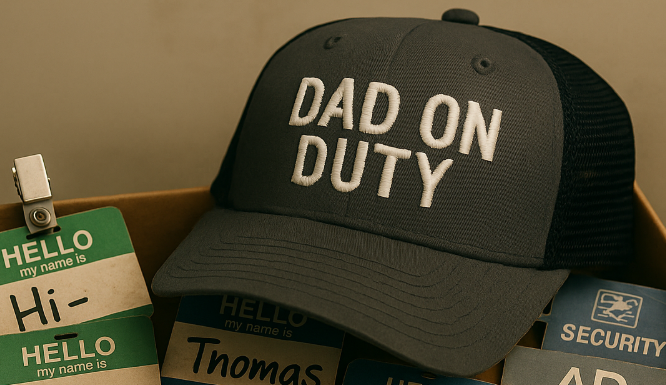Popcorn burns, gang diplomacy, and the sacred chaos of parenting
I’ve had a lot of jobs. Like… a lot of jobs. Retail alone? Twenty-seven years. (That’s longer than most of my friendships, if we’re being honest.)
I’ve done just about everything on the floor: pushing carts through sideways rain, scrubbing unholy bathroom tile, stocking shelves, running register, managing stores. It wasn’t glamorous, but it kept the lights on and the kids fed. Still—some jobs stuck with me. Not because they were cool, but because they were weird, unhinged, or just absurd enough to write about later.
Like the summer I popped kettle corn for a living. Farmer’s markets, street fairs, wholesome events…that doubled as saunas.
You’re standing in 90-degree heat, in front of a 700-degree sugar cauldron, dressed like a medieval snacksmith—heavy gloves, long sleeves, the whole deal. You’re stirring furiously like your soul depends on it (because it kind of does). And then—bam. One rogue kernel takes flight, arcs through space, and launches itself down the sleeve of your glove.
That kernel? That kernel knows what it’s doing.
It sears your wrist, rolls around like it’s auditioning for a stunt show, and somehow you’re expected to keep stirring. Because if you don’t? The whole batch burns. And burned kettle corn doesn’t just smell bad—it becomes a permanent feature of your respiratory system. Like your sinuses have been colonized by caramelized regret.
Another time, I worked at a laundromat. Seems innocent enough, right?
Wrong. Lint traps at a laundromat aren’t the cute handfuls you pull from your dryer at home. They’re industrial quilts of human history—dense mats of hair, glitter, skin flakes, wax, detergent ghosts, and sometimes… evidence of someone’s weekend. (I’ll let you imagine which bodily substances I’m referring to.)
And then—glitter. So much glitter. No one’s ever washing a disco ball. So where does it come from? Where does it go? (Cotton-Eyed Joe has questions too.)
Another summer, I was technically a drug dealer. Don’t panic. It was legal. I delivered prescriptions for a pharmacy before that was something you could DoorDash. We were trained to say “yes” if pulled over and asked, “Are there narcotics in the car?” Because statistically—there were. But we didn’t know which ones. Felt very much like playing pharmacist roulette with a clipboard.
And yes—we were trained on how to spot a tail. Because apparently… sometimes people follow drug couriers. So if you’ve ever rerouted through a mall parking lot like you were in a Jason Bourne sequel—same.
I was also a security guard at a city bus depot. Not a peaceful job. It was full of people navigating hard lives—wannabe gang members, actual gang members, and a steady stream of folks on work release. And somehow? I got along with most of them.
Not because I was intimidating. But because I respected them first. I didn’t talk down. I didn’t posture. And somehow, that got me on a first-name basis with more Nortenos than I ever expected. Empathy was my uniform. Not the badge.
All of those jobs taught me something. They were hot, weird, chaotic, gross, and sometimes… beautiful. But none of them—none of them—compare to the most important job I’ve ever had: Being a husband and a father.
And I almost lost it. Well—half of it. I’m no longer a husband. That title got revoked. And let me tell you: getting “fired” from that role hits different. It wasn’t about pride—it was about identity.
Because I’d been carrying too much for too many people. I thought I had to. I thought sacrifice was love. Turns out, it was just unsustainable martyrdom in a dad-shaped disguise. Studies suggest this kind of burnout—deeply tied to emotional suppression and role overload—can quietly unravel a parent’s well-being (Piotrowski et al., 2023).
I almost lost fatherhood too—not for lack of love, but because I was unraveling. Quietly. And no one tells you this part: the fall doesn’t look dramatic. It looks like silence. Like forgetting to laugh. Like carrying a grocery bag of your own unmet needs until the handle breaks.
But here’s the good part: I’m still a dad. And I’m a better one than I ever was before.
I don’t just check homework boxes or make spaghetti. I show up inside their inner world.
We talk about feelings here. We talk about weird dreams, hurt feelings, things they wish they could say to their mom, or to their teacher, or to themselves. And nothing—nothing—is too big or too messy to say out loud.
Our house isn’t perfect. But it’s honest. Because no one’s trying to fix anyone.
My kids trust me with their truths. And I honor that. That’s the job now.
To be the dad who shows up for the meltdown, not just the milestones. To be there when their feelings are a storm and their words haven’t caught up yet. To be the one who says:
“I see you. I’m here. I love you. I don’t need to fix you. But I’ll sit with you as long as it takes.”
Because they are so worth it.
I almost lost them. And still—they waited for me to come back to myself. That kind of trust? It’s worth becoming someone new for.
Fatherhood, like any intense role, walks the line between resilience and vulnerability. Research shows that even as fathers adopt a strong, adaptive posture, failing to process emotions can deepen the cracks they try to cover (van de Beek et al., 2025).
No one teaches you how to parent. There’s no certification. No gold stars. And parenting books? Don’t get me started. Half of them read like you’re assembling IKEA furniture with a blindfold on.
My kids aren’t projects. They’re people. Weird, brilliant, overwhelming, freakin’ miraculous people. They are Oddthentic—one of one.
And even when they’re a lot (because sometimes they are)—they are never too much. And never, ever, not enough.
I am their dad. That’s the job. And I will work—softly, fiercely, daily—to make sure I never lose it again.
